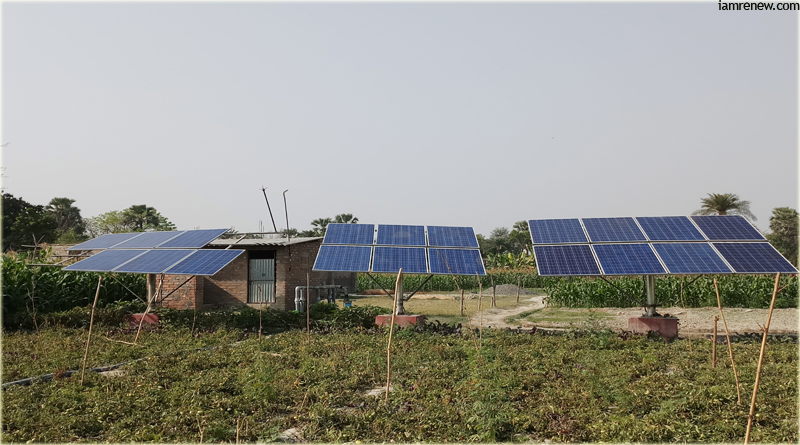Farmers in Samastipur get a solar boost

Poor quality grid power, fluctuating costs of diesel for their gensets, and the attendant air and noise pollution was a given for Chakhaji village in Samastipur. Situated in Pusa block in Bihar’s Samastipur district, the village today has become a promising example of the possibilities for renewable power, solar water pumps, in this case. Over 800 farmers taking care of nearly 240 acres of cultivable land in the village have benefited from an initiative to provide solar water pumps on easy terms and attendant training. The farming activities in the village (different varieties of vegetables being the main crop)have undergone a major change following installation of five solar pumps in the late part of 2016 ( 2 more were added in 2017) and these pumps are taking care of all irrigation related power requirement of the farmers in the village.
The programme was initiated by Aga Khan Rural Support Programme (AKRSP) and the International Water Management Institute of Tata Power and among other things, encouraging local level entrepreneurship was also a key agenda. “ Under this programme, we identified seven entrepreneurs from the village who have been provided with partial financial assistance to buy and install 5HP solar pumps. They can return back the money in five years. We have also supported them with technical know how and the installation of these pumps across the village in such a manner that it helps all the farmers. And it is proving to be quite successful as it has delivered multiple benefits,” says Ajit Chaudhary, a senior official with AKRSP in Bihar. The two agencies supporting this programme have also provided financial assistance for solar panels and other related equipments in the form of loan and subsidy.
According to Chaudhary, the use of solar power pumps has significantly improved the efficiency of the local farming community as one 5HP solar pump is capable of providing power for the irrigation of 35 acres of land. While the new system has done away with carbon dioxide emission as was the case with diesel gensets earlier used, the cost of power used by farmers too has also come down by a modest margin. “ Local farmers using diesel genset power for irrigation were earlier paying Rs 120/per hour. But now, they have to shell out Rs 90-100/hr for the solar pump power. Farmers are naturally quite happy and farming communities from surrounding villages too are willing to adopt this model,” Chaudhary adds.
Following the success at Chakhaji village, AKRSP’ farmers empowerment scheme through solar power support is likely to be implemented in more villages in the district. “ We will be implementing this programme in Chandauli village in May. We are in the process of finalising more villages where this programme can be expanded in the near run,” informed he.



